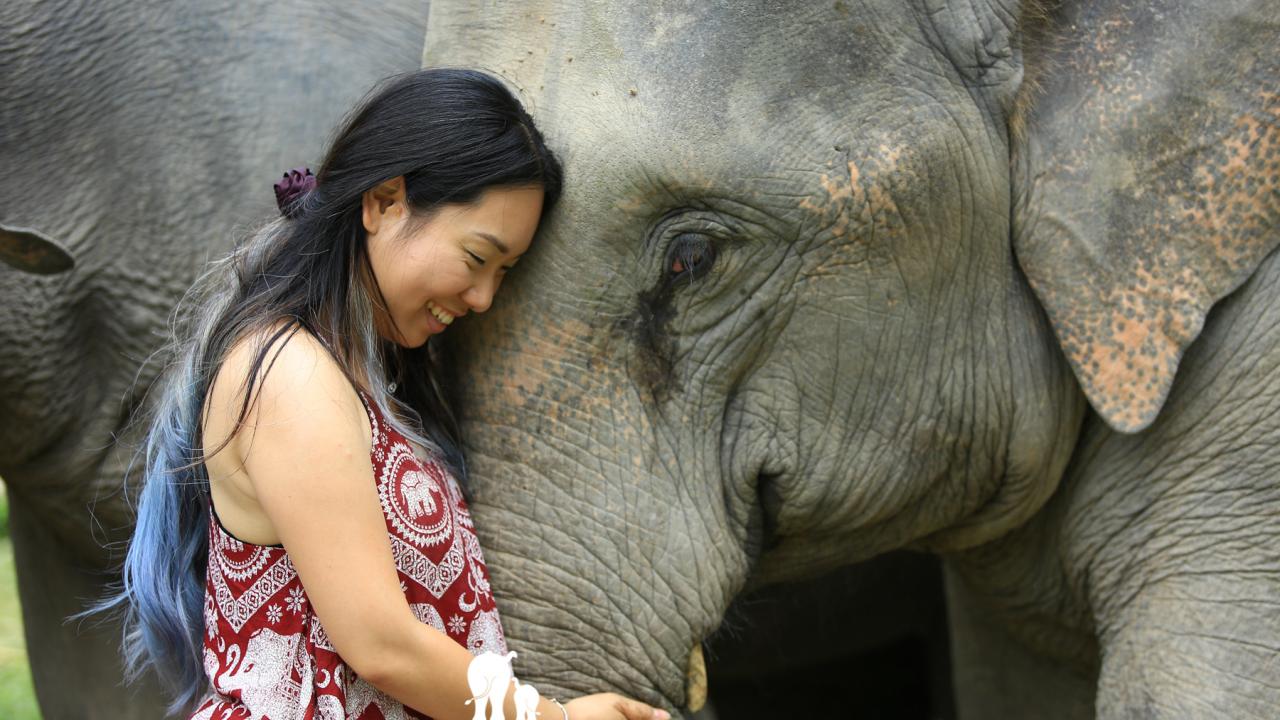
Preparing Global Leaders
Preparing Global Leaders
The One Health approach recognizes that we live in a global society and need leaders who promote comprehensive and interdisciplinary collaborations to address health threats. In the summer of 2019, twelve UC Davis veterinary students ventured abroad to participate in One Health research projects, conservation efforts and educational experiences.
From Australia to Tanzania, they pursued solutions for global issues from infectious diseases to human impacts on endangered species. These international experiences were facilitated through awards provided by donors to the Office of Global Programs totaling more than $55,000. Since 2015, 56 UC Davis DVM students have traveled to 26 countries to participate in collaborative research projects and externships. The experiences broaden their clinical skills, allow them to work in diverse communities, expand their personal and professional worldviews, and give them an appreciation for the role of veterinary medicine in addressing global health needs today and in the future.
Jamie Sebastian
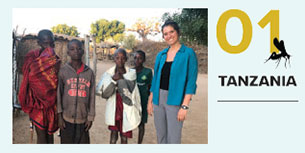 For Jamie Sebastian, five weeks in Tanzania studying the mosquito vector for Rift Valley Fever ignited a budding interest in infectious disease research. Based at the Ifakara Health Institute, she worked with medical doctors, virologists, vector researchers, statisticians, and veterinarians to study the life cycle of the mosquito. Her fieldwork consisted of traveling to different sites in the Morogoro region to learn different collection techniques for mosquito larvae. She even picked up language skills in Swahili and loved spending time with her coworkers sharing stories and learning about other cultures.
For Jamie Sebastian, five weeks in Tanzania studying the mosquito vector for Rift Valley Fever ignited a budding interest in infectious disease research. Based at the Ifakara Health Institute, she worked with medical doctors, virologists, vector researchers, statisticians, and veterinarians to study the life cycle of the mosquito. Her fieldwork consisted of traveling to different sites in the Morogoro region to learn different collection techniques for mosquito larvae. She even picked up language skills in Swahili and loved spending time with her coworkers sharing stories and learning about other cultures.
Alexandra Grillos
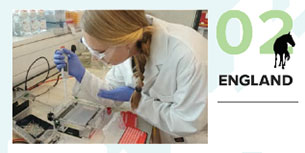 An interest in reproductive physiology, equine medicine and genetics led Alexandra Grillos to the Equine Pregnancy Laboratory at the Royal Veterinary College in London. She quickly gained a variety of skills, from running laboratory tests to presenting research papers, while studying the genetics of early pregnancy loss in Thoroughbred mares. She satisfied her love for the arts and history by exploring London and surrounding areas, from hiking the white cliffs of Dover to strolling the streets of Canterbury. The trip challenged her personally and professionally, and showed her how collaborative approaches to learning can shape advances in science.
An interest in reproductive physiology, equine medicine and genetics led Alexandra Grillos to the Equine Pregnancy Laboratory at the Royal Veterinary College in London. She quickly gained a variety of skills, from running laboratory tests to presenting research papers, while studying the genetics of early pregnancy loss in Thoroughbred mares. She satisfied her love for the arts and history by exploring London and surrounding areas, from hiking the white cliffs of Dover to strolling the streets of Canterbury. The trip challenged her personally and professionally, and showed her how collaborative approaches to learning can shape advances in science.
Claire Stuhlmann
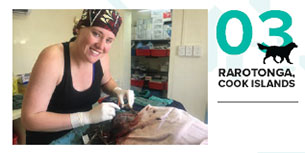 Fresh off her first year of veterinary school, Claire Stuhlmann embraced the opportunity to volunteer at the Te Are Manu Veterinary Clinic on Rarotonga, the largest of the Cook Islands. Her research investigated the prevalence and distribution of intestinal parasites in dogs, and led her to educate the community about parasites and the importance of regular deworming treatments. She learned how to communicate with clients and understand how their cultural beliefs and backgrounds influenced their decision-making. The experience encouraged her creativity, challenged her to provide treatments with limited resources, and reinforced why she chose a career in veterinary medicine.
Fresh off her first year of veterinary school, Claire Stuhlmann embraced the opportunity to volunteer at the Te Are Manu Veterinary Clinic on Rarotonga, the largest of the Cook Islands. Her research investigated the prevalence and distribution of intestinal parasites in dogs, and led her to educate the community about parasites and the importance of regular deworming treatments. She learned how to communicate with clients and understand how their cultural beliefs and backgrounds influenced their decision-making. The experience encouraged her creativity, challenged her to provide treatments with limited resources, and reinforced why she chose a career in veterinary medicine.
Saba Zewdie
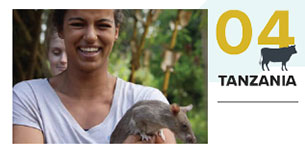 A desire to gain hands-on experience at the human, animal, and environmental interface led Saba Zewdie to a One Health-focused experience in Tanzania. She worked at the Ifakara Health Institute to analyze the prevalence and risk factors for Rift Valley Fever Virus exposure in livestock, humans, and mosquitoes. She also participated in the Rx One Health course. She and other veterinary students from around the world traveled all over Tanzania, including national parks, farms, hospitals, and research institutions. Through her experiences, she gained an appreciation for the organization, communication, and multi-disciplinary problem solving that One Health work requires.
A desire to gain hands-on experience at the human, animal, and environmental interface led Saba Zewdie to a One Health-focused experience in Tanzania. She worked at the Ifakara Health Institute to analyze the prevalence and risk factors for Rift Valley Fever Virus exposure in livestock, humans, and mosquitoes. She also participated in the Rx One Health course. She and other veterinary students from around the world traveled all over Tanzania, including national parks, farms, hospitals, and research institutions. Through her experiences, she gained an appreciation for the organization, communication, and multi-disciplinary problem solving that One Health work requires.
Tanner Talan
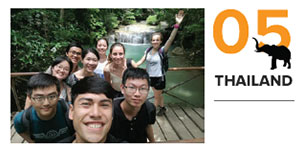 Tanner Talan (front center) spent eight weeks getting a sneak peak into a career as a research veterinarian in Thailand. He worked at Kasetsart University, Kamphang Saen campus to develop treatments for elephant endotheliotropic herpesvirus 1, a disease with a high mortality rate in young elephants. While at the university, he was also able to help with treatments on tigers and elephants, develop an EEHV monitoring station at a local zoo, and participate in an Advance Research Course for international students. He enjoyed experiencing the Thai culture and developed a deeper understanding of the commitment the Thai people have to their country.
Tanner Talan (front center) spent eight weeks getting a sneak peak into a career as a research veterinarian in Thailand. He worked at Kasetsart University, Kamphang Saen campus to develop treatments for elephant endotheliotropic herpesvirus 1, a disease with a high mortality rate in young elephants. While at the university, he was also able to help with treatments on tigers and elephants, develop an EEHV monitoring station at a local zoo, and participate in an Advance Research Course for international students. He enjoyed experiencing the Thai culture and developed a deeper understanding of the commitment the Thai people have to their country.
Cara Newberry
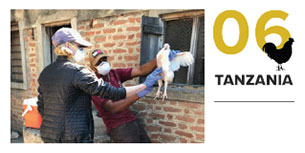 Cara Newberry traveled to Iringa, Tanzania to work with the Health for Animals and Livelihood Improvement project, Iringa Municipal Council, and the Tanzania Veterinary Laboratory Agency. Her research focused on antibiotic resistant E. coli isolated from chickens on poultry farms and she visited local veterinary shops to learn about antibiotic use and knowledge of resistance in the region. She also traveled to Dar es Salaam to join the Rx One Health course. She and the other participants traveled throughout Tanzania, learning how to approach seemingly unsolvable but incredibly important One Health issues, how to develop solutions and turn them into actions.
Cara Newberry traveled to Iringa, Tanzania to work with the Health for Animals and Livelihood Improvement project, Iringa Municipal Council, and the Tanzania Veterinary Laboratory Agency. Her research focused on antibiotic resistant E. coli isolated from chickens on poultry farms and she visited local veterinary shops to learn about antibiotic use and knowledge of resistance in the region. She also traveled to Dar es Salaam to join the Rx One Health course. She and the other participants traveled throughout Tanzania, learning how to approach seemingly unsolvable but incredibly important One Health issues, how to develop solutions and turn them into actions.
Stacy Kim
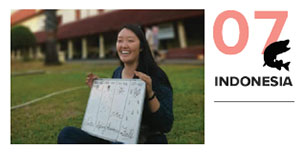 At Hasanuddin University in Makassar, Indonesia, Stacy Kim found herself in a unique position to research treatments for a major outbreak of Trichodina, a protozoal parasite that can cause respiratory disease, in a population of juvenile sea bass. She visited other large-scale aquaculture facilities where she gained an appreciation of the amount of work involved in disease management. Stacy also participated in the Mars Coral Reef Rehabilitation program and helped maintain underwater structures designed to assist with coral survival and growth. The experiences motivated her to discover how she can utilize her veterinary education towards improving health outcomes for cultured aquatic animals.
At Hasanuddin University in Makassar, Indonesia, Stacy Kim found herself in a unique position to research treatments for a major outbreak of Trichodina, a protozoal parasite that can cause respiratory disease, in a population of juvenile sea bass. She visited other large-scale aquaculture facilities where she gained an appreciation of the amount of work involved in disease management. Stacy also participated in the Mars Coral Reef Rehabilitation program and helped maintain underwater structures designed to assist with coral survival and growth. The experiences motivated her to discover how she can utilize her veterinary education towards improving health outcomes for cultured aquatic animals.
Jill Huynh
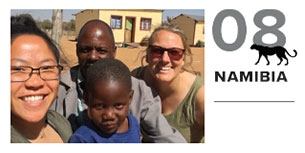 As a child, Jill Huynh (far left) dreamed of saving the wild animals of Africa. Her dreams became reality when she traveled to Otjiwarongo, Namibia where she interned at the Cheetah Conservation Fund. She worked with the team to educate farmers about wildlife conservation and ways that they can take active roles in saving species from extinction. She also collaborated with local veterinarians to vaccinate cats and dogs and educate owners about animal healthcare. The trip offered her the opportunity to share the One Health mission and spread awareness of how the health of the environment, animals, and humans are interconnected.
As a child, Jill Huynh (far left) dreamed of saving the wild animals of Africa. Her dreams became reality when she traveled to Otjiwarongo, Namibia where she interned at the Cheetah Conservation Fund. She worked with the team to educate farmers about wildlife conservation and ways that they can take active roles in saving species from extinction. She also collaborated with local veterinarians to vaccinate cats and dogs and educate owners about animal healthcare. The trip offered her the opportunity to share the One Health mission and spread awareness of how the health of the environment, animals, and humans are interconnected.
Tracy Hayward
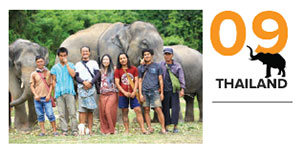 Traci Hayward (center) traveled to Thailand to conduct research on the human-animal bond in Thai elephant keepers and tiger caretakers. She visited elephant and tiger sanctuaries and interviewed mahouts and tiger trainers who taught her about basic wildlife husbandry, behavior, and handling. She also worked with the wildlife veterinarians of Kasetsart University and the Elephant Thai national hospital. The experiences enhanced her analytical and clinical skills and inspired her to foster and develop professional connections between the UC Davis School of Veterinary Medicine and veterinary faculty at Kasetsart University.
Traci Hayward (center) traveled to Thailand to conduct research on the human-animal bond in Thai elephant keepers and tiger caretakers. She visited elephant and tiger sanctuaries and interviewed mahouts and tiger trainers who taught her about basic wildlife husbandry, behavior, and handling. She also worked with the wildlife veterinarians of Kasetsart University and the Elephant Thai national hospital. The experiences enhanced her analytical and clinical skills and inspired her to foster and develop professional connections between the UC Davis School of Veterinary Medicine and veterinary faculty at Kasetsart University.
Amanda Garrick
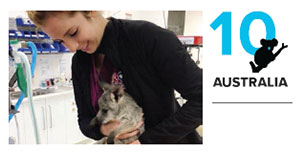 Australia’s unique wildlife, coupled with her interests in clinical medicine and conservation, led Amanda Garrick to New South Wales, Australia where she worked at Sydney University’s Avian, Reptile, and Exotic Pet Hospital. She applied her first two years of veterinary school knowledge to new species and assisted with everything from feeding a baby rainbow lorikeet to an ultrasound on a mother koala. Exposure to new species helped her become more confident in applying her skills and excited about using them in her future career.
Australia’s unique wildlife, coupled with her interests in clinical medicine and conservation, led Amanda Garrick to New South Wales, Australia where she worked at Sydney University’s Avian, Reptile, and Exotic Pet Hospital. She applied her first two years of veterinary school knowledge to new species and assisted with everything from feeding a baby rainbow lorikeet to an ultrasound on a mother koala. Exposure to new species helped her become more confident in applying her skills and excited about using them in her future career.
Anna Duh
 Anna Duh traveled to Taiwan to learn about green sea turtles and their nesting sites. She shadowed researchers at the National Taiwan Ocean University and learned to tag and microchip sea turtles, assist with physical examinations, and care for turtles rehabilitating from illness or injury. During the second half of her summer, she traveled with a group of volunteers to Lanyu, or Orchid Island, off the coast of Taiwan. The team researched the impact of light from nearby human activity (such as streetlights) on sea turtle nesting patterns and the ability of hatchlings to navigate to the ocean.
Anna Duh traveled to Taiwan to learn about green sea turtles and their nesting sites. She shadowed researchers at the National Taiwan Ocean University and learned to tag and microchip sea turtles, assist with physical examinations, and care for turtles rehabilitating from illness or injury. During the second half of her summer, she traveled with a group of volunteers to Lanyu, or Orchid Island, off the coast of Taiwan. The team researched the impact of light from nearby human activity (such as streetlights) on sea turtle nesting patterns and the ability of hatchlings to navigate to the ocean.
Ashley Birakos
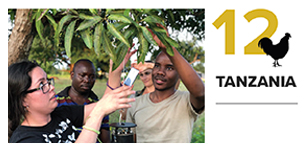 Interests in poultry and zoonotic diseases led Ashley Birakos to Tanzania where she worked with the Genomics to Improve Poultry Innovation Laboratory at Sokoine University of Agriculture. She collected samples from chickens at the live bird markets to detect Newcastle Disease. During the second half of her trip, she joined the Rx One Health course where she gained experience in field sampling and surveillance. Through discussions with stakeholders, she gained a better understanding on how policy plays a large role in implementing solutions using a One Health approach.
Interests in poultry and zoonotic diseases led Ashley Birakos to Tanzania where she worked with the Genomics to Improve Poultry Innovation Laboratory at Sokoine University of Agriculture. She collected samples from chickens at the live bird markets to detect Newcastle Disease. During the second half of her trip, she joined the Rx One Health course where she gained experience in field sampling and surveillance. Through discussions with stakeholders, she gained a better understanding on how policy plays a large role in implementing solutions using a One Health approach.
